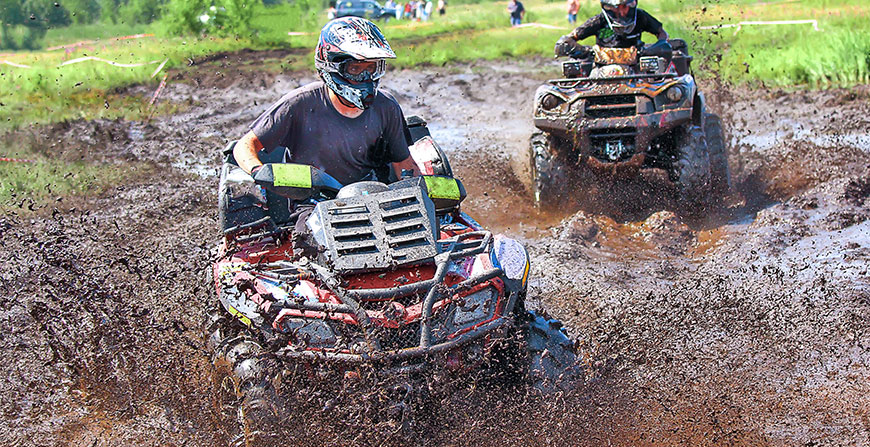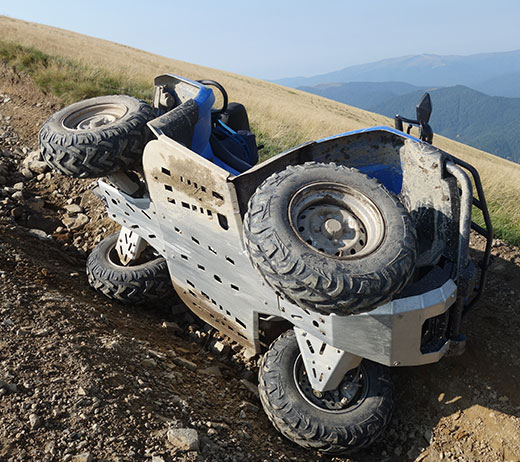
Texas ATV/Recreational Vehicle Accident Lawyers
Tough representation for Austin and Dallas ATV and recreational vehicle victims
Texans are lucky enough to experience warm weather during most of the year. For teenagers, young adults, and older riders there are many different types of recreational vehicles to enjoy. All-terrain vehicles (ATVs) in particular are popular due to their ability to ride over rough terrain. However, ATVs can be dangerous – riders may take unnecessary chances, the vehicles provide little protection, and accidents can cause serious injury.
At Slack Davis Sanger, our experienced ATV accident lawyers have more than 200 years of combined experience fighting for personal injury victims. We understand the unique challenges involved with ATV and recreational accident cases. There are special laws that apply. There are unique reasons why accidents happen. There are questions about who is liable that need to be answered. Rest assured that our Texas ATV/recreational vehicle lawyers understand how to handle these unique challenges. We have a strong record of success in personal injury cases.
“Slack Davis Sanger came highly recommended to me by a colleague. From my first meeting with Mike Davis, I knew my sisters and I had made the right choice. Slack Davis Sanger managed all of the details and people day-to-day…This firm delivered – and more.”- Kyle Smith, Client
What are the different types of ATV and recreational vehicles?
The ATV Safety Institute defines an ATV as a “motorized off-highway vehicle.” ATVs are made to travel on four low-pressure or non-pneumatic tires. They have a seat designed to be straddled by the operator. The handlebars are used for steering. There are ATVs for single operators, no passengers, and ATVs designed for an operator and one passenger. ATVs come in different sizes. The models for younger riders are designed for smaller feet and hands, and these ATVs travel at lower speeds.
ATVs are used to ride on different types of terrain, including gravel, dirt, sand, swamplands, asphalt, ice, and snow. ATVs should be driven on off-roads – not main roads or streets.
Riders should take approved ATV courses that are age- and experience-appropriate. The ATV Safety Institute recommends that:
- Riders wear helmets approved by the Texas Department of Transportation. They should also wear goggles, long-sleeved shirts, long pants, boots, and gloves.
- Operators should never ride on paved roads with the possible exception of crossing – and only if done with caution.
- Riders under 16 should be supervised.
Other types of recreational motorized vehicles that are normally used off of the main roads include:
Electric vehicles. These are basically standard bicycles that have an electric motor. While the rider can pedal the bicycle, the motor can assist the operator as well.
Dirt bikes. This is a type of motorcycle designed for rough terrain.
Motorbikes. This is essentially a lightweight motorcycle.
Utility vehicles. These are four-wheeled vehicles generally used for specific tasks. They usually have an open cab and all-wheel drive.
A popular type of recreational vehicle is a three-wheeled motorcycle, also called a trike. They may seem safer than two-wheeled motorcycles because they have an extra wheel, but they can be dangerous. Three-wheeled motorcycles are generally easier to turn than traditional motorcycles. However, they’re small, they don’t have safety features like airbags, and riders may take unreasonable chances because they think the third wheel will make their vehicle more stable. These vehicles can be operated on some main roads.
Mopeds are another type of lightweight motorcycle but should be driven in designated moped and bicycle lanes here in Texas.

What causes ATV accidents?
Some of the reasons ATV accidents occur include:
- A lack of experience. Riders should start with a beginner’s course.
- Aggressiveness. Many riders are too confident and often take risks because they think ATVs are toys. ATV operators must use caution, know the paths they are taking, and drive to match the weather conditions.
- Intoxication. Some riders think it’s okay to have a beer or two and then operate an ATV. That’s not true. Intoxication slows a driver’s reflexes, judgment, and ability to control the vehicle.
- Defective parts. These can include, according to Quadbike.com, defective gas tanks, throttles, and clutches.
Other causes of ATV accidents include driving on roads not meant for off-road vehicles, unfamiliarity with the terrain, speeding, and climbing hills, as ATVs have a propensity to roll over. ATV accidents are also likely if there are more passengers than the vehicle is designed to handle.
According to QuadBikeGuide.com, there are about 15,000 ATV accidents each year, and in 2017, 766 people died in ATV accidents.
What are Texas ATV laws?
Transportation Code Title 7 Chapter 363 requires that ATV owners and operators comply with the following laws:
- To operate the ATV on public property, the operator must have a proper safety certificate, completed an approved safety training course, or be supervised by an adult with a valid safety certificate.
- Operators under 14 must be supervised and accompanied by a parent, guardian, or authorized adult.
- ATVs must be properly equipped, including quality brakes and muffler systems, headlights, and taillights, and operated during regulated hours.
- Drivers can’t operate the ATV on highways, roads, or public streets with limited exceptions – including crossing roads that are not highways, yielding to oncoming traffic, and meeting other requirements.
- Operators and passengers must wear US DOT-approved helmets and eye protection on public property.
What are common ATV and recreational vehicle accident injuries?
Victims of ATV and other types of recreational vehicle accidents may suffer:
|
|
At Slack Davis Sanger, our Texas ATV and recreational vehicle accident lawyers review your injuries with your doctors. We work to obtain a complete diagnosis and prognosis of your injuries. We detail your current medical bills, and all the medical care and expenses you will have in the future. Our lawyers also work with your medical team to fully show all the ways your injuries are affecting every part of your life.
How does liability work in an ATV accident case?
The owners of the land where an ATV or recreational vehicle accident happens have a duty to ensure the property is safe for riders. The owners may be liable for an accident if the trails are not properly maintained and cleared. Many ATV cases involve product liability and negligence claims that are filed against the manufacturers of defective vehicle parts. In other cases, passengers have the right to file a claim against careless drivers.
Do you have an ATV/recreational accident lawyer near me?
Slack Davis Sanger has three Texas offices for your convenience. Our Austin office is located at 6001 Bold Ruler Way, Suite 100. Our Dallas office is located at 3500 Maple Avenue, Suite 1200.
Talk to experienced Texas ATV injury attorneys today
At Slack Davis Sanger, we work with investigators, the police, and anyone with knowledge of the incident to help show how your ATV/recreational vehicle accident happened, and who is responsible. Many ATV accidents are caused by defective parts which are subject to recalls. Our lawyers are seasoned product liability lawyers. To discuss your rights or the rights of your child after any type of off-road vehicle accident, call us at 800-455-8686 or fill out our contact form. Our Austin and Dallas lawyers are ready to help you today.
